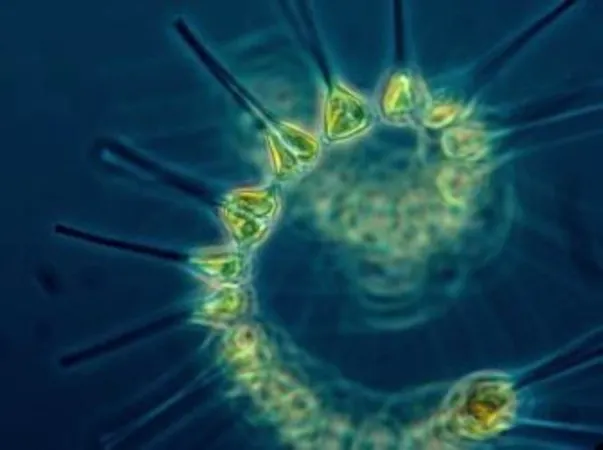
Revolution in the Oceans: How Plankton are Adapting to Climate Change
2025-06-01
Author: Li
In the vast blue expanse of our oceans, tiny heroes known as plankton play a critical role in sustaining marine ecosystems and influencing global climate by sequestering carbon.
Recent groundbreaking research has unveiled the impressive adaptability of these organisms. Utilizing extensive real-world data, scientists have revealed how plankton can modify their cell membrane chemistry in response to fluctuating light and nutrient levels.
A Vital Link in the Ocean Food Web
Encompassing both phytoplankton and zooplankton, plankton serve essential functions within the marine food chain. Phytoplankton harness sunlight to convert carbon dioxide into energy, providing a fundamental food source for diverse sea life.
These chemical adjustments in plankton are not trivial; they can dramatically influence chemical exchanges with other marine organisms, potentially reshaping fisheries and the broader ocean economy.
Surviving the Heat: Plankton Cell Adjustments
Researchers, led by Dr. Weimin Liu from the University of Bremen, studied lipid membranes that maintain cell integrity. In cooler waters, certain plankton switch to shorter fat chains, keeping cells flexible. In contrast, warmer oceans see some species enriching their membranes with saturated fatty acids, a response to nutrient availability.
Remarkably, in darkness, some plankton increase unsaturated fat production to cope with low light levels. These adaptations highlight the incredible versatility of plankton to thrive amidst changing conditions.
Chemistry and the Impact on Marine Life
As plankton alter their chemical makeup, they can significantly change nutrient availability for fish and other organisms. Such shifts could have cascading effects on carbon uptake and the cycling of essential elements within ocean ecosystems.
When conditions favor certain plankton species, it transforms predator-prey dynamics, likely impacting the populations of larger marine animals dependent on these essential organisms.
Potential Ramifications for Global Fish Populations
The implications of these shifts are dire for fish communities reliant on specific fatty acids produced by phytoplankton. Changes in temperature and nutrient distributions may compromise the nutritional quality of these acids, leading to significant challenges for commercial fishing sectors.
If plankton begin favoring lower-quality fats, it could create a nutritional ripple effect throughout the food web, impacting everything from small fish to the larger predators that feed on them.
Harnessing Data for Stronger Conservation Efforts
Collecting extensive lipid data from field studies is notoriously difficult, making collaboration and technology crucial in capturing the full scope of these changes. Improved analytical techniques may provide critical insights into how plankton respond chemically and what this means for marine biodiversity.
Understanding these chemical dynamics is vital for resource managers and could steer future conservation strategies in vulnerable marine habitats.
The Big Picture: Plankton and Climate Change
As the planet's largest habitat, the open ocean is home to a staggering variety of plankton adaptations. How these organisms react to changes in temperature and nutrient levels can reveal significant trends related to carbon cycling and climate phenomena.
By strengthening data-sharing networks globally, scientists can better assess shifts across oceanic regions, providing invaluable insights into the underlying ecological responses trotted out by plankton.
Looking Ahead: The Future of Our Oceans
Linking lipid measurements with ocean chemistry surveys can deepen our understanding of plankton adaptations and their consequences for fish communities. Continuous tracking of these biochemical changes will be essential as ocean conditions evolve.
Plankton are not just food; they are pivotal to our climate, helping to sequester carbon and regulate atmospheric gases. As their membranes and strategies shift in response to warming waters, the implications for carbon storage and species distribution could be profound.
In an age where human activity and climate change incessantly pressure natural systems, researching planktonic adaptations will be crucial in formulating informed conservation strategies.
This vital study has been published in the journal Science Advances, reaffirming the critical role plankton play in our oceans and their potential to adapt to a rapidly changing environment.

 Brasil (PT)
Brasil (PT)
 Canada (EN)
Canada (EN)
 Chile (ES)
Chile (ES)
 Česko (CS)
Česko (CS)
 대한민국 (KO)
대한민국 (KO)
 España (ES)
España (ES)
 France (FR)
France (FR)
 Hong Kong (EN)
Hong Kong (EN)
 Italia (IT)
Italia (IT)
 日本 (JA)
日本 (JA)
 Magyarország (HU)
Magyarország (HU)
 Norge (NO)
Norge (NO)
 Polska (PL)
Polska (PL)
 Schweiz (DE)
Schweiz (DE)
 Singapore (EN)
Singapore (EN)
 Sverige (SV)
Sverige (SV)
 Suomi (FI)
Suomi (FI)
 Türkiye (TR)
Türkiye (TR)
 الإمارات العربية المتحدة (AR)
الإمارات العربية المتحدة (AR)